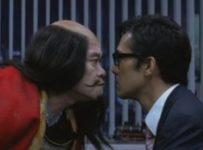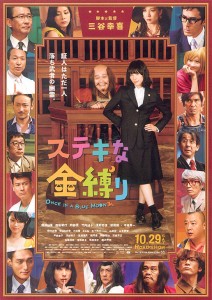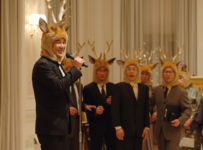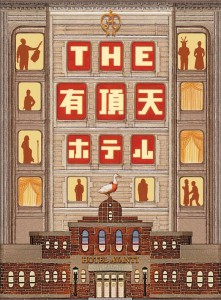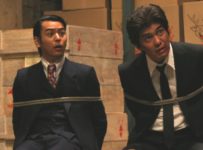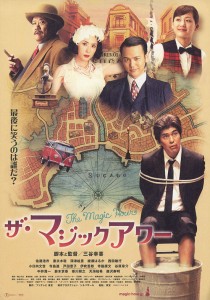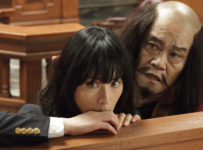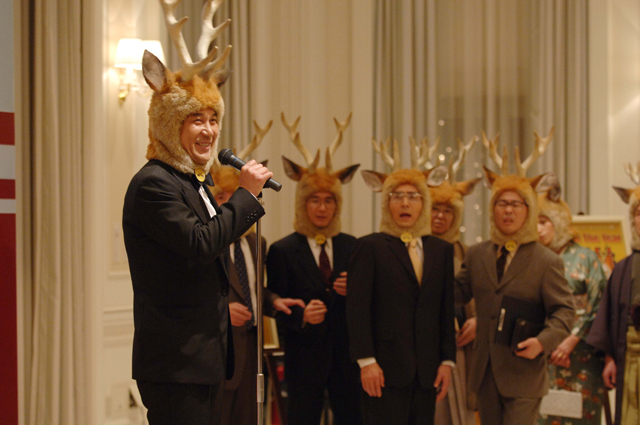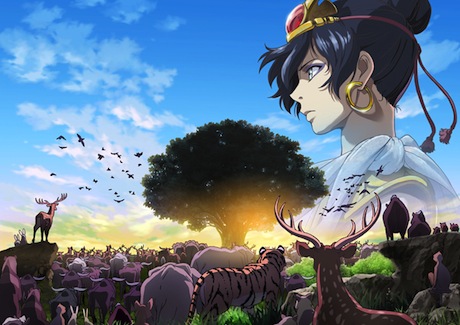[stextbox id=”grey” caption=”A Ghost of a Chance (2011)” float=”true” align=”right” width=”200″]
Director: Koki Mitani
Runtime: 142 minutes
Starring: Eri Fukatsu, Toshiyuki Nishida, Kiichi Nakai, Hiroshi Abe
Country: Japan
Rating: Worth A Look (?)
[/stextbox]
It really came as no surprise when Koki Mitani’s A Ghost of a Chance (ステキな金縛り aka Once in a Blue Moon ) opened to a ¥533,4 million ($7 million US) weekend at the box office just a few weeks ago. The King of Comedy had previously seen massive successes with audiences on Suite Dreams and The Magic Hour, and his unique brand of comedy has a strong appeal with the Japanese market. However, his lack of success abroad has baffled many commentators, perhaps because he falls between the cracks of the arthouse crowd and the more extreme cult genres that Japanese cinema has been known for in the last few years. The 15th Japanese Film Festival in Australia aims to remedy that somewhat with a mini-retrospective of Mitani’s films. With the opening ceremony held in Sydney last night, it was the perfect way to commence a festival that is filled with more comedy than ever before.
Emi Hosho (Eri Fukatsu, Villain) is a failing lawyer, trying to live up to the legacy of her dad’s career. When she is assigned an unusual case of a client accused of murdering his wife, things take a turn for the strange. The defendant (played by musician KAN, LoveDeath) claims that he was staying at an inn at the time, and was trapped by a kanashibar, or supernaturally induced sleep paralysis. Determined not to lose another case, Emi travels to the inn where she encounters Rokubei Sarashina (Toshiyuki Nishida, Star Watching Dog),a 421 year-old samurai who also happens to be a ghost. As the only witness to her client’s innocence, Emi convinces him to testify in court. The only problem is getting the rest of the world to see what she sees.
Mitani’s high-concepts are always bordering on the ridiculous, and are at their best when they cross right over into insane territory. A Ghost of a Chance really shouldn’t work as a concept, and the fact that it mostly pulls off the task of drawing in a mass crowd is something to be applauded. Holding this film together is a leading performance from Toshiyuki Nishida, who is used to stealing every scene he is in. Best known to the Western world as Pigsy from the TV series of Monkey, he is every bit the 400 year old samurai. Playing it completely over the top, his character dominates the film to such an extent that the defendant must humbly ask “Isn’t this trial about me?”. When Nishida does leave the screen, his presence is palpably absent, although the other characters each have their quirks worth exploring.
Like many of Mitani’s recent works, A Ghost of a Chance suffers from its unwieldy length, and this is perhaps a hangover from his extensive theatre background. What has traditionally tempered this is a cracking pace that wouldn’t seem out of place in a Howard Hawks film, but here the film certainly takes its time to get moving. The extended exposition is not as overtly madcap as his last feature, The Magic Hour, and it is not until the introduction of the legendary Toshiyuki Nishida that the film begins to pick up pace. However, many of Mitani’s familiar elements are all in place in the opening sequence, including Koji Yamamoto (Ninja Kids!!!) in a delightful caricature of a moustache-twirling villain from the silent era. Part of the success of Mitani’s previous efforts have been the anachronistic bubble in which Mitani’s films exist, and A Ghost of a Chance has a thoroughly modern setting, albeit a very warped take on it.
If you accept Mitani’s central conceit, and you kind of have to, there is much to love about A Ghost of a Chance. There are several deus ex machinas that seem to drop in when it is most convenient to the plot, including the death of one character, but this is all in the (pardon the pun) spirit of the thing. Fumiyo Kohinata’s feather-suit wearing and Frank Capra loving being from another world adds his own flair to proceedings, and Eri Fukatsu’s breaks free of her Bayside Shakedown TV origins and delivers a wide-eye enthusiasm that is needed as a counterpoint to Kiichi Nakai’s (Princess Toyotomi) anti-villain.
[stextbox id=”custom”]A Ghost of a Chance is typically long Mitani, but filled with well-crafted levels of silliness. The perfect opener for this year’s Japanese Film Festival and hopefully one that will see Mitani finally find some success in the West.[/stextbox]
A Ghost of a Chance opened the Japanese Film Festival in Sydney on 17 November 2011. It will also open the Melbourne leg of the festival on 29 November 2011 at the 15th Japanese Film Festival in Australia.
